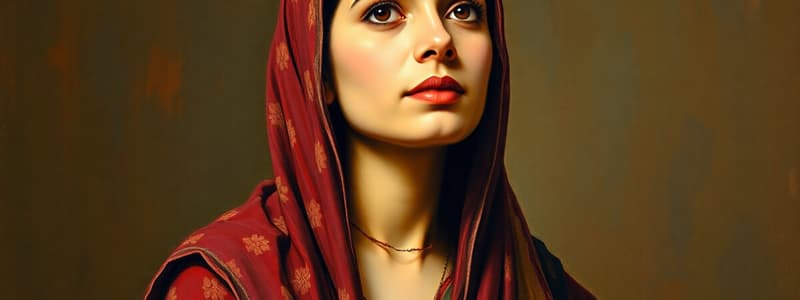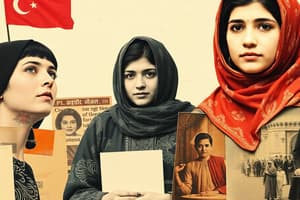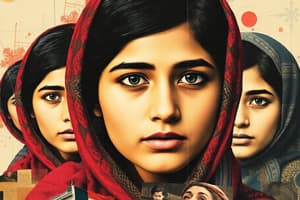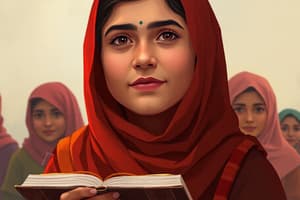Podcast
Questions and Answers
Malala's brother Khushal's statement about wishing to be a girl to avoid school primarily highlights which societal irony in the context of the story?
Malala's brother Khushal's statement about wishing to be a girl to avoid school primarily highlights which societal irony in the context of the story?
- The privileged position boys hold in accessing education compared to girls in their community. (correct)
- The disruption caused by the school closures impacted boys' routines more significantly than girls'.
- The societal expectation that education is less crucial for girls, making school seem like a burden to boys.
- The universal desire of children to evade formal education, irrespective of gender.
The public's preoccupation with Malala's veil, amidst the crisis of girls being denied education, serves to illustrate which deeper societal issue?
The public's preoccupation with Malala's veil, amidst the crisis of girls being denied education, serves to illustrate which deeper societal issue?
- The complex interplay between cultural identity and human rights in conflict zones.
- The deflection of focus from fundamental rights to superficial concerns, especially regarding women. (correct)
- The media's tendency to sensationalize personal aspects over systemic problems during crises.
- The global community's genuine concern for individual religious freedoms and expressions.
Malala's sudden self-consciousness about her appearance – noticing her 'dark skin', 'thick eyebrows', and 'moles' – immediately following the threats to her education, most likely represents:
Malala's sudden self-consciousness about her appearance – noticing her 'dark skin', 'thick eyebrows', and 'moles' – immediately following the threats to her education, most likely represents:
- an internalization of societal beauty standards exacerbated by increased public attention.
- a typical adolescent phase of increased self-awareness and body image concerns.
- a genuine shift in her perception of self, influenced by external criticism and media portrayal.
- a displacement of anxiety, shifting focus to personal flaws as a coping mechanism. (correct)
The New York Times journalist's question, 'What would you do if there comes a day when you can't go back to your valley and school?' serves primarily to:
The New York Times journalist's question, 'What would you do if there comes a day when you can't go back to your valley and school?' serves primarily to:
Malala's father's initial reluctance to have the camera crew film at their home, contrasted with his eventual consent, suggests:
Malala's father's initial reluctance to have the camera crew film at their home, contrasted with his eventual consent, suggests:
When Malala declares, 'They cannot stop me. I will get my education,' to the cameraman, this statement is best interpreted as:
When Malala declares, 'They cannot stop me. I will get my education,' to the cameraman, this statement is best interpreted as:
The description of the last day of school feeling 'as if we were going to a funeral' primarily utilizes which literary device to convey the emotional impact of the school closures?
The description of the last day of school feeling 'as if we were going to a funeral' primarily utilizes which literary device to convey the emotional impact of the school closures?
Malala's father's 'smiling uncomfortably with a mixture of pride and sadness' when looking at her articulates:
Malala's father's 'smiling uncomfortably with a mixture of pride and sadness' when looking at her articulates:
Malala's fear of ending up 'like girls who quit school to cook and clean' reveals a societal perspective that primarily equates education with:
Malala's fear of ending up 'like girls who quit school to cook and clean' reveals a societal perspective that primarily equates education with:
The phrase 'Some in distant parts of the world. Some right in Swat, in Taliban strongholds' following Malala's statement about education, emphasizes:
The phrase 'Some in distant parts of the world. Some right in Swat, in Taliban strongholds' following Malala's statement about education, emphasizes:
Flashcards
Girls Out of School
Girls Out of School
A situation where girls are prohibited from receiving education.
Malala's Interviews
Malala's Interviews
Malala participated in interviews to advocate for girls' rights but avoided watching them.
Appearance Concerns
Appearance Concerns
Malala became self-conscious about her looks, influenced by societal perceptions.
Meeting with Journalists
Meeting with Journalists
Signup and view all the flashcards
Last Day of School
Last Day of School
Signup and view all the flashcards
Documentary Focus
Documentary Focus
Signup and view all the flashcards
Call to Action
Call to Action
Signup and view all the flashcards
Fear of Losing School
Fear of Losing School
Signup and view all the flashcards
Support from Peers
Support from Peers
Signup and view all the flashcards
Taliban Influence
Taliban Influence
Signup and view all the flashcards
Study Notes
Malala's Experiences
- Malala, a young girl, reflects on her experiences and feelings about girls' education and her role in the movement for girls' rights.
- She describes her feelings about being different from the other girls and having her identity challenged, affected by her appearance and her family's expectations.
Documentary Focus
- A documentary crew decides to film Malala on her last day of school.
- Her father initially opposes the idea, wishing for their home to be excluded
- Malala's father accepts requesting the crew film her last day from start to end
- Malala asserts a demand for education, stating that education is not confined to any location.
School Closure and Concerns
- Malala reflects on the school closure and the implications on her future education
- She contemplates the potential future of girls who are not educated.
Family and Personal Feelings
- She highlights a personal struggle with her appearance, noting her dark skin, thick eyebrows, small eyes, and moles.
- She feels a sense of sadness and hopelessness concerning her future education.
- She talks of a meeting with journalists which influenced her desire to pursue continuing her education.
- Malala's father seeks the advice of the journalists during a meeting, asking about the future after they are unable to return to the area after school closes.
- She expresses her hope and stubbornness for the future, saying, "That will not happen."
- Malala expresses her feelings about her future, emphasizing that she desires an education.
- Later, she discusses a funeral-like atmosphere while leaving school, reflecting on the significance of her last day.
- A significant portion of the students stay home for the day's events.
Studying That Suits You
Use AI to generate personalized quizzes and flashcards to suit your learning preferences.




